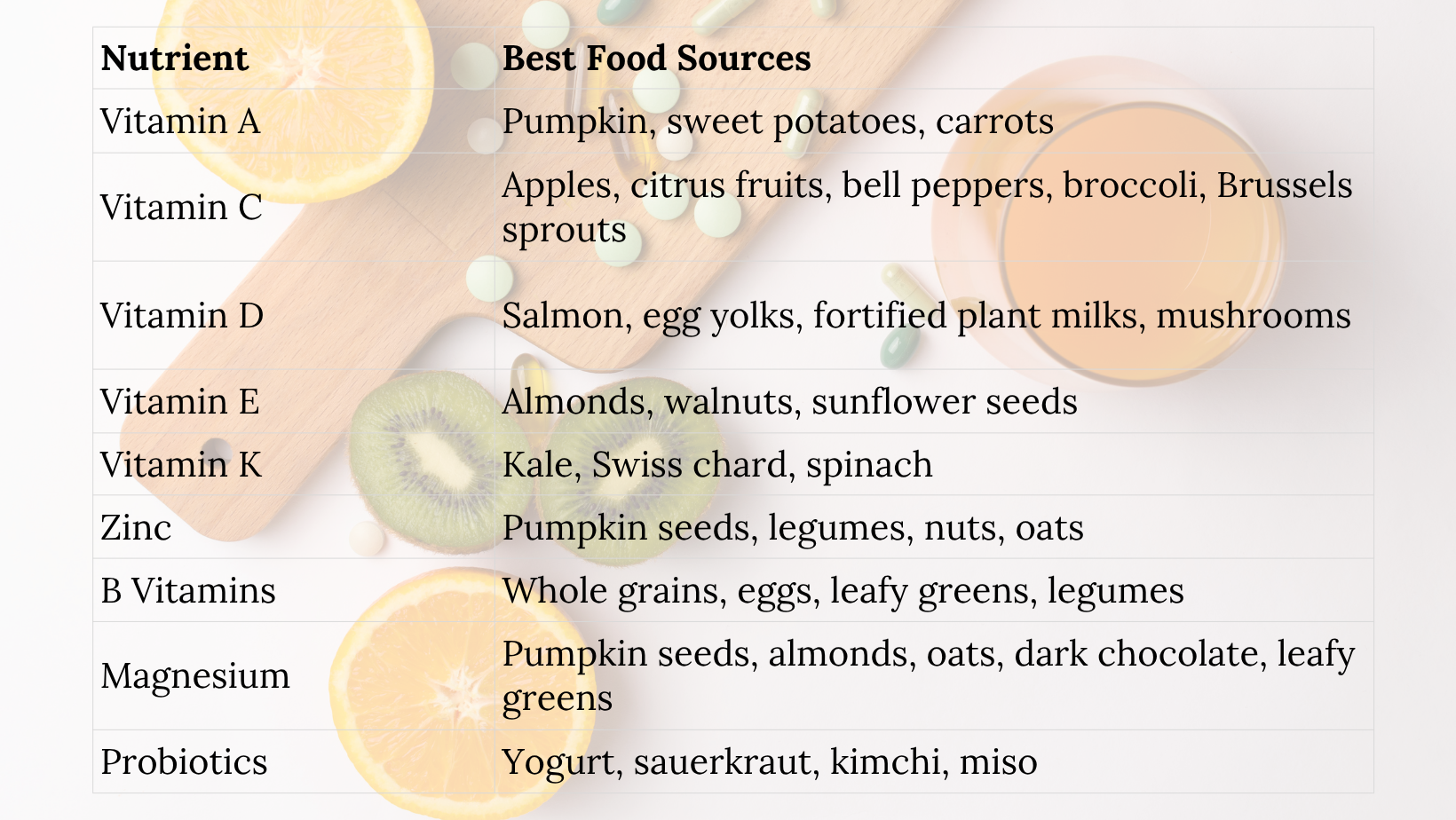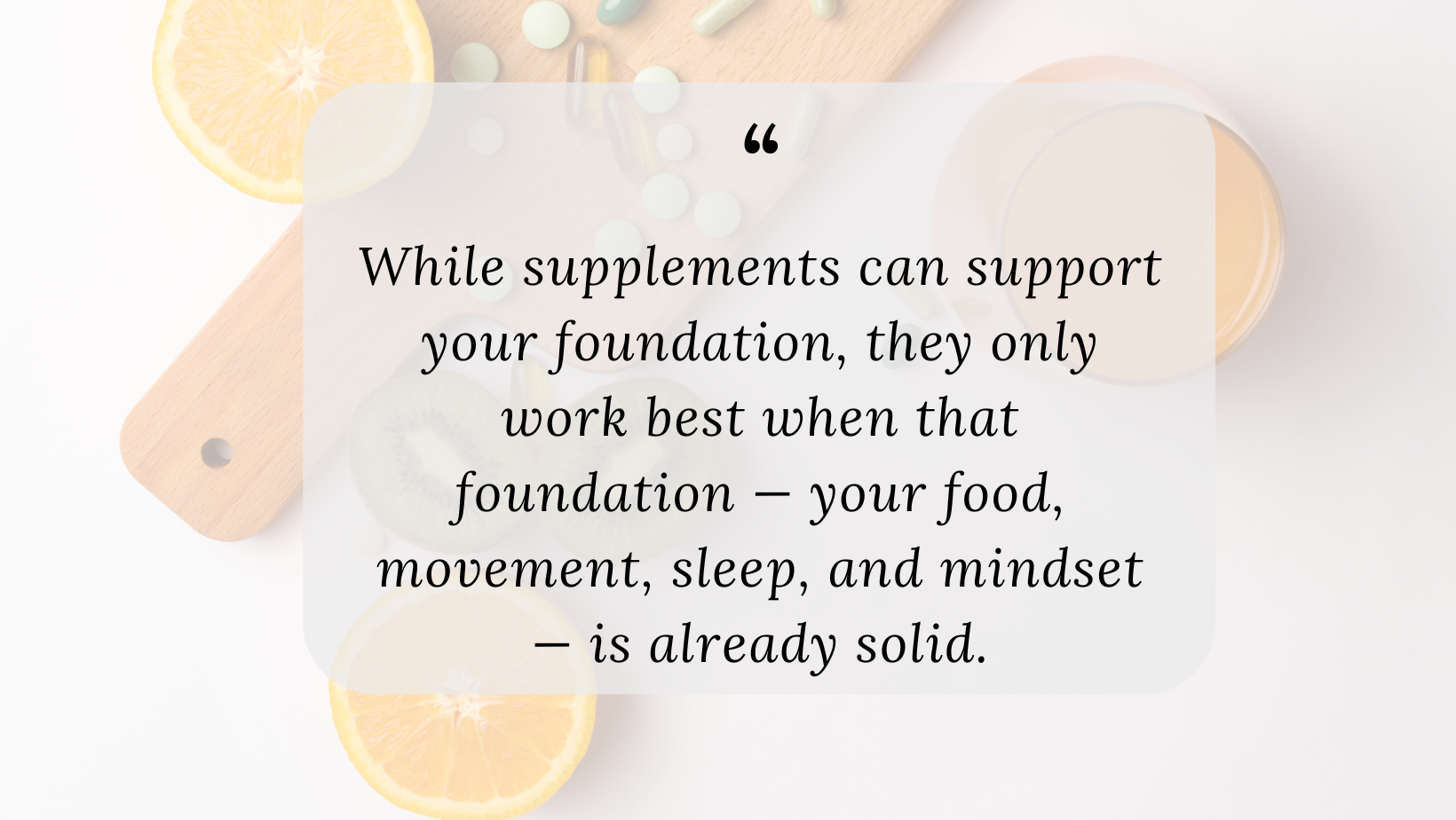9 Nutrients Every Woman Needs in Fall

Lately, I’ve noticed that my meals have started to look… pretty much the same.
Between work, daycare pickups, and the rhythm of everyday life, my food has become reliable — but not necessarily varied.
And with everyone around me sneezing and coughing, I realized it was time to reassess my nutrient intake and set myself up for a healthy fall (and hopefully flu-free) winter season.
As daylight shortens, our circadian rhythm shifts — influencing hormones like cortisol and melatonin that affect energy, sleep, and appetite.
At the same time, our immune system becomes more active as exposure to viruses increases, meaning micronutrient demands rise.
Fall, in other words, is not just a cozy season — it’s a physiological adjustment period.
That makes it the perfect time to check in with your body and give it what it needs to stay resilient — through food first, and, if necessary, with a few carefully chosen supplements.
Why Fall Nutrition Matters
When temperatures drop, we move less, get less sunlight, and often crave more calorie-dense comfort foods.
This can reduce intake of fiber, antioxidants, and omega-3 fats — nutrients that regulate inflammation, stabilize blood sugar, and support hormonal balance.
For women especially, a nutrient-dense fall diet helps support:
- Hormone metabolism (through B vitamins, zinc, and magnesium)
- Immune resilience (vitamins C, D, A, E, and zinc)
- Energy production (via B-vitamin–dependent mitochondrial enzymes)
- Skin and hair health (vitamins A, E, and omega-3s)
Let’s look at the nutrients most worth focusing on as the season changes.
🥕 Key Vitamins and Nutrients for Fall

Vitamin A
Vitamin A regulates gene expression for immune cells and supports the turnover of skin and mucosal tissue — your first defense against pathogens.
Found in: Pumpkin, sweet potatoes, carrots.
➡️ Tip: Pair beta-carotene–rich foods with a source of fat (like olive oil or nuts) to boost absorption.
Vitamin C
Acts as a potent antioxidant and supports the formation of collagen — crucial for skin and connective tissue repair. It also regenerates vitamin E and enhances iron absorption.
Found in: Apples, citrus fruits, kiwi, bell peppers, broccoli, Brussels sprouts.
➡️ Tip: Try to incorporate at least one vitamin C-rich fruit or vegetable into each meal to maintain strong immune defense throughout flu season.
Vitamin D
Beyond bone health, vitamin D acts as a hormone that influences immune cell signaling and the regulation of inflammation. Low levels are linked to fatigue, low mood, and menstrual irregularities.
Found in: Salmon, egg yolks, fortified plant milks, mushrooms.
➡️ Supplement tip: I take a daily vitamin D supplement with my breakfast (Greek yogurt) through fall and winter — simple and effective.
Vitamin E
Protects cell membranes from oxidative damage and helps balance inflammatory pathways that can affect skin and hormone function.
Found in: Almonds, walnuts, sunflower seeds.
➡️ Tip: Add a small handful of nuts or seeds daily for antioxidant support.
Vitamin K
Vital for bone mineralization and for activating proteins that regulate calcium deposition — preventing it from accumulating in blood vessels.
Found in: Kale, Swiss chard, spinach.
➡️ Tip: Sauté dark leafy greens in olive oil to improve absorption of fat-soluble vitamins.
Zinc
Required for over 300 enzymes involved in cell repair, hormone production, and immune defense. Even mild deficiency can weaken immune response and slow wound healing.
Found in: Pumpkin seeds, legumes, nuts, oats.
➡️ Supplement note: I’m currently taking zinc alongside vitamin D — especially useful when everyone around me has a cold.
B Vitamins
B6, B12, and folate act as co-enzymes in methylation — a process crucial for hormone metabolism, mood regulation, and energy production in mitochondria.
Found in: Whole grains, eggs, leafy greens, legumes.
➡️ Tip: If you feel more fatigued as days shorten, check your B12 and iron levels — both influence red blood cell formation.
Magnesium
Magnesium is one of the first nutrients to run low when stress, caffeine, or busy schedules take over — and it’s essential for more than 300 reactions in the body.
It supports muscle relaxation, stable blood sugar, hormone metabolism, and deep sleep by calming the nervous system and balancing cortisol.
For women, magnesium can also ease PMS symptoms and reduce inflammation — both of which tend to flare when routines change and stress rises.
Found in: Pumpkin seeds, almonds, oats, dark chocolate, leafy greens.
➡️ Tip: Add pumpkin seeds to oats or a square of dark chocolate after dinner for a natural magnesium boost.
If needed, magnesium glycinate or citrate are gentle supplement forms, but food should always come first.
Probiotics
70- 80 % of your immune system resides in the gut. Probiotics help maintain microbial balance, support estrogen metabolism, and may reduce inflammation triggered by seasonal stress.
Found in: Yogurt, sauerkraut, kimchi, miso.
➡️ Tip: Add fermented foods daily — even a spoonful of sauerkraut with lunch makes a difference.
🥦 Seasonal Food Highlights for Women’s Health
- Dark leafy greens provide iron, magnesium, and vitamin K for bone integrity and hormone metabolism.
- Sweet potatoes & pumpkins supply beta-carotene, fiber, and vitamin C to strengthen gut and immune function.
- Apples offer pectin fiber that nourishes gut bacteria and helps stabilize blood sugar.
- Nuts, seeds & legumes deliver vitamin E, zinc, and magnesium — buffering inflammation and supporting hormone balance.
🌾 Whole Foods First — Always
While supplements can help close small gaps (I currently use vitamin D and zinc), they should always remain what they are: supplements. And even here, timing matters.
They support, but never replace, a diet rich in whole foods.
A capsule can’t replicate the synergy of vitamins, minerals, fiber, and phytonutrients that plants and whole grains provide.
Think of supplements as insurance, not the foundation.
💬 Final Thoughts
Fall is about slowing down — but not running down.
Your physiology adapts to colder temperatures, shorter days, and more time indoors — and your nutrition can help it adapt smoothly.
By adding color, variety, and a few key nutrients to your meals, you can strengthen your immunity, energy metabolism, and hormonal balance for the months ahead.
So if your meals have been on repeat (like mine), consider this your gentle nudge to mix them up — and feed your body the way you want to feel this season: grounded, strong, and resilient.
💊 What I’m Taking This Season
Even though I aim for variety on my plate (and plenty of pumpkin soup!), there are a few things I like to keep consistent through fall and winter.

Here’s what’s in my current routine:
- Vitamin D — a must once sunlight hours drop. It supports immune balance, mood, and hormone regulation.
- Zinc — especially during cold and flu season. It’s key for immune defense and tissue repair.
I rotate supplements depending on how I feel, how much sunlight I’m getting, and what my meals have looked like lately.
Because while supplements can support your foundation, they only work best when that foundation — your food, movement, sleep, and mindset — is already solid.
